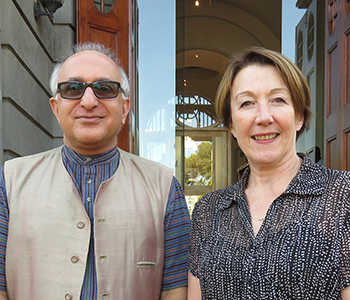Latest News Archive
Please select Category, Year, and then Month to display items
02 January 2025
|
Story Gerda-Marie van Rooyen
|
Photo Supplied
 Leading the research in South Africa is Prof Linus Franke from the Department of Soil, Crop and Climate Sciences.
Leading the research in South Africa is Prof Linus Franke from the Department of Soil, Crop and Climate Sciences.
Scientists are actively pursuing the successful breeding of diploid hybrid potatoes from inbred lines. This is expected to revolutionise potato breeding as it holds the key to rapid genetic progress. It will introduce new varieties for commercialisation through seed. Currently, existing potato variants have a gene that renders self-pollinated seeds infertile.
Prof Linus Franke, an academic in the Department of Soil, Crop and Climate Sciences at the UFS, is leading the research in South Africa. “This technology allows the production of genetically uniform potato seed that is easy to transport and largely disease-free.” He says this differs from conventional breeding whereby only vegetative propagation is possible due to tetraploid varieties in potatoes. It also risks carrying pests and diseases from one generation to the next – leading to the accumulation of pests and diseases with each round of multiplication.
Seed innovation
Prof Franke explains that Solynta BV, a seed company based in the Netherlands that produces potato varieties that can be grown from seed, has included South Africa in their research efforts because it is one of Africa’s largest producers and exporters. Through his academic relationship with Wageningen University and Research, a Dutch institution renowned for its agricultural endeavours and food production, the UFS became involved in researching hybrid potatoes grown from seed.
Diploid seeds containing two sets of chromosomes allow easier gene manipulation to increase predictability and speedier genetic progress. The breeding approach enables the incorporation of tolerance to pests, diseases, abiotic stresses (cold, heat, drought) and other desired genetic traits.
Although Prof Franke is optimistic about this research, he is not blind to disadvantages. “Potato seeds are tiny and have little energy reserves, making it harder to grow potatoes from seed than from tubers.” He says potatoes from seed will take longer to cultivate than tubers, as farmers need to grow plantlets from seeds first, adding six weeks to the growing period. “It is possible that commercial farmers can grow potatoes directly from seed. Alternatively, perhaps more likely, specialised growers will produce tubers of potatoes from seed; these tubers are then sold as seed tubers to other potato farmers, who then continue their normal practices of producing potatoes for the market from tubers.”
Financial benefits
Prof Franke says farmers have reason to get excited. “Seed potatoes will reduce input costs, as varieties with enhanced tolerance to pests and diseases require less pesticides. Planting one hectare of potatoes requires three to four tonnes of potato tubers, but only one 25 g packet of potato seeds.” Since potatoes are a more valuable commodity than maize, this technology might also increase farmers’ income potential.
Andrew Mellon Foundation renews ongoing support for UFS projects
2017-04-10
 Dr Saleem Badat and Annemia van der Heever.
Dr Saleem Badat and Annemia van der Heever.The University of the Free State (UFS) was first awarded a grant by the Andrew W Mellon Foundation (AWMF) in 2015 to fund several projects between 2015 and 2016 under the International Higher Education Strategic projects fund. The programme’s director, Dr Saleem Badat, visited the UFS on 23 March 2017 as part of his annual first-quarter feedback sessions, with not only the UFS but other universities around the country that benefited from the programme. Top of the agenda was a meeting with principal investigators of projects funded by the foundation, to discuss the UFS’s institutional priorities for funding, alongside the university’s management, to discuss possible intra-institutional projects to be undertaken with other universities.
During his visit, Dr Badat met with Prof Nicky Morgan, UFS Acting Vice-Chancellor and Rector, as well as the AWMF representative, Annamia van der Heever, Director: Institutional Advancement. He discussed future plans with managers of the Programme for Innovation in the Artform Development, #Movements project, Inclusive Professoriate Grant and the Curriculum reform programme which involved seven other universities.
The AWMF, through its projects, is instrumental in developing and maintaining strong higher education institutions that produce knowledge and high-quality graduates, and advances social justice. The projects further aim to deepen and broaden public understanding and support for the arts and humanities, diversity and inclusion. “The Foundation each year presents universities with wonderful opportunities to improve teaching, learning and research in the humanities. We are working hard with the Faculty of Humanities on possible submissions for 2017,” said Van der Heever.
During 2017 between $10.8 million and $12 million will be available for grants by the Foundation’s International Higher Education and Strategic Projects programme. The Vice-Chancellor’s Office will continue to serve as a contact point and administrative support for UFS projects currently funded by AWMF. Institutional Advancement will assist project leaders to draft submissions to the Foundation this year and in the future. In 2018 AWMF will celebrate 30 years of involvement in supporting higher education in South Africa.